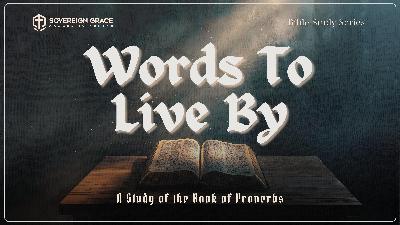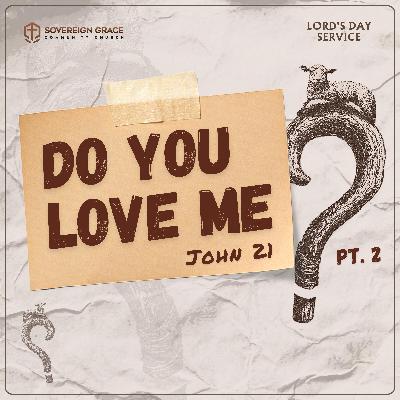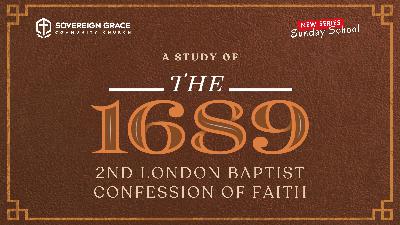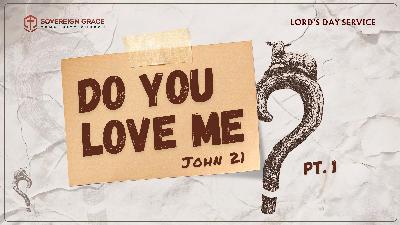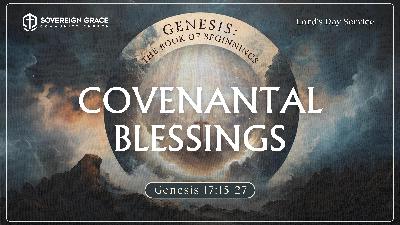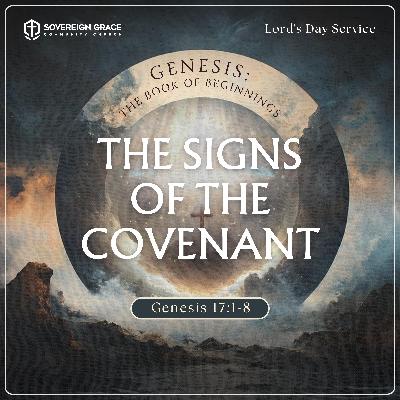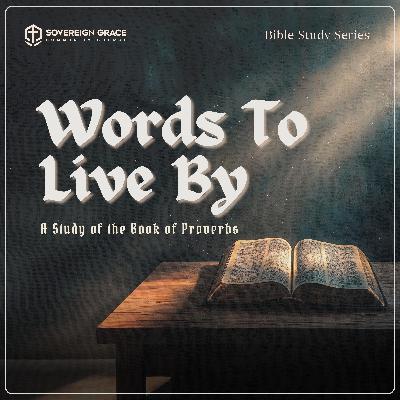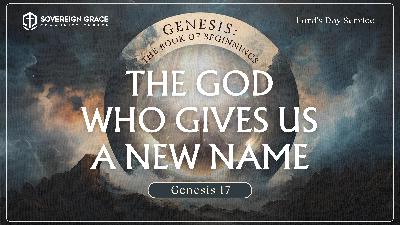Discover Sovereign Grace Community Church, Abuja
Sovereign Grace Community Church, Abuja
Sovereign Grace Community Church, Abuja
Author:
Subscribed: 6Played: 10Subscribe
Share
© Copyright 2018 . All rights reserved.
Description
A Reformed Church that exists to spread the gospel, serve our community, and glorify God in all we do. We’re at Sunflower Mall, Lokogoma Road, Lokogoma. Abuja.
Join us in fellowship on Sundays at 9am and Wednesdays at 6pm.
You can follow us on X, Facebook, Instagram and YouTube by searching @SGCCAbuja
Join us in fellowship on Sundays at 9am and Wednesdays at 6pm.
You can follow us on X, Facebook, Instagram and YouTube by searching @SGCCAbuja
526 Episodes
Reverse
Words To Live By: On Wisdom and Speech Part 2
God’s faithfulness is not fragile like a spider’s web but strong and unbreakable, like steel chains anchoring a mighty ship. His commitment to save us is steady, stretching through time into eternity, and His mercies are new every morning.
In Genesis 20, we see this faithfulness shine even through Abraham’s failure. By giving Sarah to Abimelech, Abraham, though unintended, seemed to threaten God’s redemptive plan, yet God intervened. Salvation is about His glory, and He will not allow His purposes to fail because of our faithlessness. This passage reminds us that supernatural experiences are not proof of belonging to God. Abimelech, a heathen king, received a vision, yet true salvation rests in God’s covenant love. In His faithfulness, He restrains sin, rescues His children, and defends us against every accusation.
Our relationship with God is not based on our morality but on His electing love and unchanging generosity. He takes personal responsibility for His people, our Redeemer, Advocate, and Defender. In Christ, we see His overwhelming faithfulness, a love that covers us despite our flaws.
Reflection: Like Abimelech, we are called to come humbly before Jesus, who prays and intercedes for us.
Words To Live By: On Wisdom and Speech Part 1
In this sermon, Pastor Kehinde reflects on Jesus’ conversation with Peter in John 21, exploring the restoring power of Christ’s love—a love deeper than man’s deepest hate. Jesus asks Peter three times, “Do you love me?”—not because He needs Peter’s love, but because He desires intimacy with His disciple. Each time, He follows the question with a command: “Follow me.” This is not mere sentiment but a call to action, to feed His sheep and live for His glory.
Pastor Kehinde reminds us that Christ’s love is undeserved, unconditional, and deeply personal. We bring nothing to the table, and yet He loves us—not for how much we pray or how consistent we are, but because of His grace. It is often when we come to the end of ourselves that we discover His love most fully.
Christ’s love is not indulgent—it is purifying. Like Peter, we may be grieved when He rebukes or disciplines us, but this is how He shapes us, purifies our motives, and keeps us dependent on Him. This process prepares us for a world that is increasingly hostile to the truth.
This message calls us to courage—to uphold the truth in love, to expose sin and confess it, and to embrace the refining work of Christ. His is a love that restores, even when it hurts, and a love that prepares His people to follow Him faithfully, even to the point of sacrifice.
Sunday School | 1689 London Baptist Confession of Faith
Pastor Kehinde from Hackney Evangelical Reformed Church brought a message to SGCC, focusing on Jesus’ post-resurrection conversation with Peter. Christ’s repeated question, “do you love me?” reveals that loving Jesus is a matter of faith, not of physical sight, and that God’s ongoing relationship with believers is founded on personal love and restoration. Jesus restores Peter after his denial, showing that even in our weakness or failure, Christ rebukes but never abandons—He renews us by speaking peace and giving the Holy Spirit, our source of belonging and wholeness.
The sermon emphasises that the defining mark of Christianity is love for God, inspired by His sovereign choice and sacrificial love; our imperfect love is always met by Christ’s perfect love, which pursues and accepts us despite our shortcomings. Peter’s restoration on the shore mirrors every believer’s journey—chosen, forgiven, and called to reciprocate Christ’s love and live on mission, confident that the Lord’s grace is sufficient, even when our zeal falters
Words To Live By: On Anger Part 2
In today’s message, Remember Lot's Life, part of our Genesis series on Beginnings, Ezekiel Adetunji teaches from Genesis 19:1–26, reminding us that the little things matter. Lot appeared righteous, yet his righteousness was compromised by comfort and convenience. His decision to pitch his tent near Sodom seemed small, but it drew him into compromise and exposed his family to corruption. What began as little choices—seeking prosperity over covenant, tolerating sin rather than resisting it—eventually unravelled his household. His wife looked back longingly at Sodom, his daughters absorbed its depravity, and his descendants became enemies of God’s people.
The message warns us that “little” sins are never harmless. Just as Lot’s compromises eroded his influence and legacy, so unchecked habits, friendships, and desires can slowly poison our faith and family. Lot escaped judgment, yet he lost almost everything that mattered, showing us that survival without obedience is not the same as blessing.
We are urged to guard against small compromises that lead to great destruction. The little things matter, and God calls us to live by covenant, not by comfort, resisting cultural poison and walking in wholehearted obedience.
Sunday School | 1689 London Baptist Confession of Faith|
Words To Live By: On Anger
Covenant Privileges
Words To Live By: The Cure for Greed
Pastor Adeola continues the Genesis series in this sermon which he titled Covenantal Blessings. He taught from Genesis 17:15–27, where God includes Sarah in His covenant promise. Her name is changed from “Sarai” (my princess) to “Sarah” (princess of nations), lifting her role from household dignity to a global covenant purpose.
This affirms her equal share in God’s redemptive plan and reminds us that His greatest gifts are not merely circumstantial blessings—wealth, comfort, or success—but covenantal blessings: union with God, transformation of character, and the privilege of living before His face. Like Moses, who refused to go forward without God’s presence despite promises of prosperity (Exodus 33), we are reminded that circumstantial blessings without God are empty, but covenantal blessings bring life and lasting fellowship (Numbers 6).
Abraham responds with reverent amazement at the promise of a child through Sarah in old age, yet he trusts God’s word. His plea for Ishmael shows he grasped that the true blessing was not material prosperity but life in God’s presence. When God finished speaking, Abraham circumcised himself, Ishmael, and every male in his household that very day—over 400 men—demonstrating immediate and costly obedience.
The message urges us, like Moses and Abraham, to value covenantal blessings above circumstantial ones and to respond to God’s call with wholehearted trust and prompt obedience.
Sunday School | 1689 London Baptist Confession of Faith|
Words To Live By: The Foolishness of Greed | Bible Study | 20th July, 2025
In today’s sermon, The Signs of the Covenant, part of our Genesis series on Beginnings, Pastor Adeola Ogundele unpacks Genesis 17:9–14 to compare circumcision under the old covenant and baptism under the new covenant.
Circumcision was given to Abraham as a visible sign of belonging, pointing to purification and the need for a new heart. Yet in the old covenant, one could bear the sign without truly belonging to God’s family, as with Ishmael and Esau. God’s law remained outside of them.
In Christ, the old covenant signs have been fulfilled. Circumcision, temple sacrifices and priestly rituals were scaffolding that has now given way to the substance. The new covenant is marked by inward transformation through the Spirit. God now writes His law on our hearts, and you cannot belong to this covenant without belonging to His family.
The new covenant sign is baptism. Unlike circumcision, it does not mark national identity but personal faith. It declares our union with Christ, testifying to the inward change of new birth. The water itself does not save, but it points to the deeper reality of the profession of salvation.
This contrast warns us that outward signs must flow from inward faith, assuring us that we belong to Christ and live by His Spirit.
Words To Live By: The Foolishness of Greed
In today’s message, The Signs of the Covenant, part of our Genesis series, Pastor Adeola Ogundele explores Genesis 17:7–14 to show that God’s covenant with Abraham has both physical and spiritual fulfilment, ultimately realized in Christ and His church.
God promised Abraham nations and kings, land, and His abiding presence. These were fulfilled in part through Israel—descendants from Sarah, Hagar, and Keturah grew into nations, over forty kings reigned from Saul to the exile, Israel entered and possessed the land of Canaan in Joshua’s day, and God’s presence dwelt among them through the tabernacle and temple. Yet these pointed to greater realities: the eternal King Jesus, a heavenly homeland prepared by God, and His presence with His people forever.
The sign of circumcision, though practiced in other cultures, was given new meaning by God—as a lasting reminder of His covenant, a symbol of heart circumcision from sin, and a declaration that His blessings come not by human effort but by faith. Abraham obeyed even at great personal cost, showing that trust in God often requires surrender. For believers today, the true and everlasting covenant is found in Christ, whose promises cannot fail.
Words To Live By: On Laziness and Diligence
The God Who Gives Us A New Name | Lord's Day Sermon


